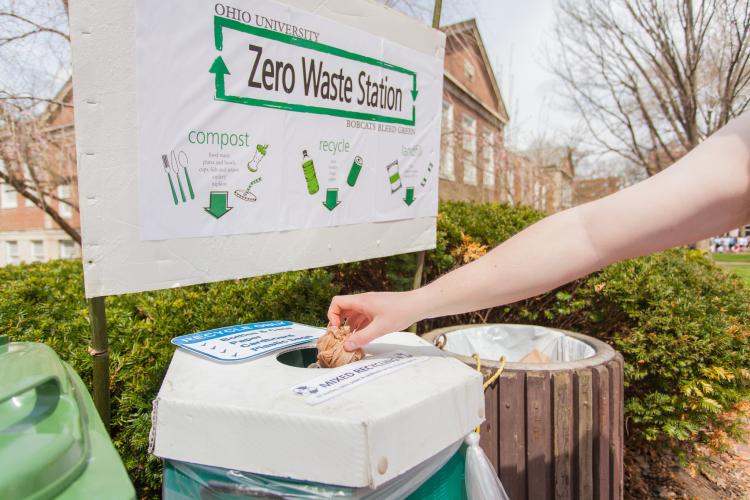
Appalachia Ohio Zero Waste Initiative receives renewal funding from Sugar Bush Foundation

The Appalachia Ohio Zero Waste Initiative (AOZWI) will continue to foster initiatives and activities to contribute to the long term goal of a zero-waste economy during the 2020-21 fiscal year with $70,000 in funding from the Sugar Bush Foundation, approved at the June Ohio University Foundation Board of Trustees meeting.
The Sugar Bush Foundation, a supporting organization of The Ohio University Foundation, approached Rural Action and Ohio University’s Voinovich School of Leadership and Public Affairs in 2010 to apply for joint funding to help decrease waste going to the landfill, increase recycling and turn waste to an asset in Southeast Ohio.
“We’re determined to tackle waste, and we like to walk with our partners long-term to help them engage in a systematic, infrastructural and cultural change,” said Hylie Voss, president of the Sugar Bush Foundation. “Continuing to fund the AOZWI for another year after fulfilling our decade-long commitment is what allows that change to occur.”
Before the AOZWI partnership began in 2010, Athens and Hocking counties recycled only 9% of residential and commercial waste in the Athens and Hocking County Waste District, the third lowest recycling rate in Ohio. Through AOZWI’s waste reduction and recycling efforts, the two counties now surpass the Ohio EPA waste diversion goal of 25% at nearly 37% recovery of waste and are among the lowest waste generators in the state.
AOZWI also has encouraged Ohio University to work toward its zero-waste goals. OHIO will divert more than 90% of its waste from landfills by 2025 through composting, reduction and recycling. The AOZWI helped inculcate a positive culture of recycling among the college student population, especially at large events such as music festivals and sports events. Supporting activities have created educational programming in the community and on campus; services to local businesses and social enterprises; increased access to recycling and composting infrastructure; green event standards; and more.
“We got this far and now we have to continue to work together to achieve greater results,” said Ed Newman, Rural Action’s zero waste director. “Through better utilization of natural and recovered resources, we hope to have an economy that fully emulates ecological processes. We need to stray from extracting scarce resources and minimize disposing generated waste into the ground, air and water because they will eventually lead to more problems.”
Southeast Ohio’s economy continues to depend on resource extraction, such as coal, oil, gas and timber.
“We want to reduce the pressure of resource extraction on the environment by creating an infrastructure where consumed resources are channeled back into the economy by turning the waste into assets instead of liability,” said Newman.
The AOZWI works with businesses to adopt zero-waste models to create more profitable operations and sustainable practices. In the last 10 years alone, the AOZWI helped to create 10 new waste-related businesses and will create more environmentally friendly economic opportunities in the coal-affected region of Ohio. Waste conversion businesses allow communities to experience economic benefits like jobs and a greater tax base while keeping the profits close to home and continuing to circulate.
At a community level, the funding will also allow the AOZWI to have an AmeriCorps member serve in the Athens mayor’s office to assist and increase the city’s sustainability initiatives. Voss said the AmeriCorps member will elevate the municipal, regional and county government’s zero-waste goals.
For the Voinovich School, funding will include support for an environmental studies graduate student to work on waste-related topics and support development and implementation of on-campus sustainability initiatives.
“This funding support lets us build on our experience and partnerships to date to further reduce obstacles to a vibrant zero-waste economy and culture,” said Elissa Welch, project manager at the Voinovich School. “Thanks to the generous investment of the Sugar Bush Foundation, the AOZWI has been able to use the dollars to leverage more than $2 million for additional projects and activities that grow the region’s zero waste economy and mindset.”
This is the eleventh year of Sugar Bush Foundation funding for the AOZWI partnership between Rural Action and the Voinovich School of Leadership and Public Affairs.
For more information about the project, contact Elissa Welch, welche@ohio.edu.